Scientific Post-Processing of AZFP Data
Data visualization ~ EchoView Software ~ Sonar5 Software ~ Customized Routines
The AZFPLink software, normally used to configure the AZFP instrument, can be used to plot echograms for one-hour time segment. This is done from within the Echogram Tab.
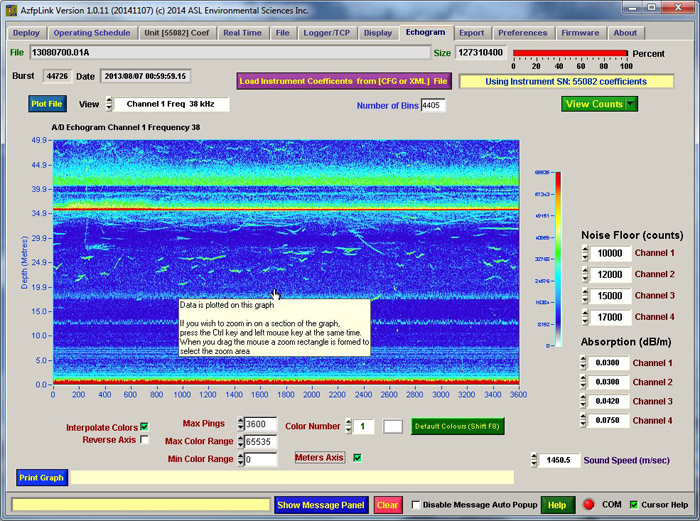
Sample Echogram screen
Volume Backscatter (Sv), Target Strength (TS) and Digital Counts data can be exported in comma delimited format (.CSV) format using the Export TAB with in AZFPLink. The data files will be binary format or a comma-delimited ASCII format (CSV).
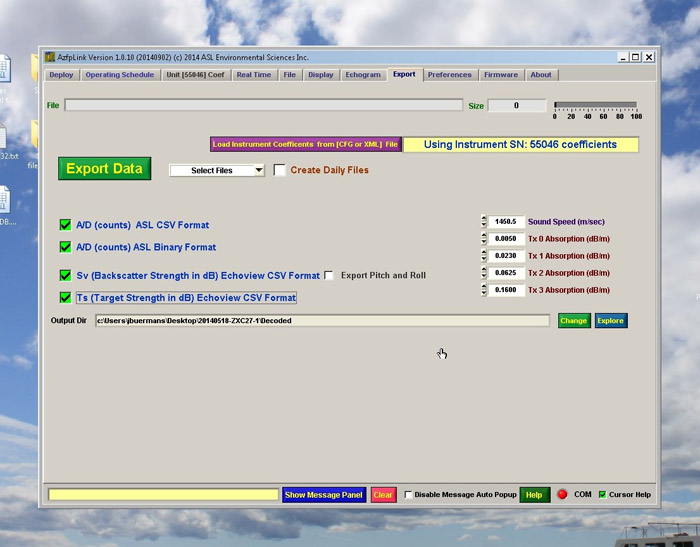
Sample Export screen
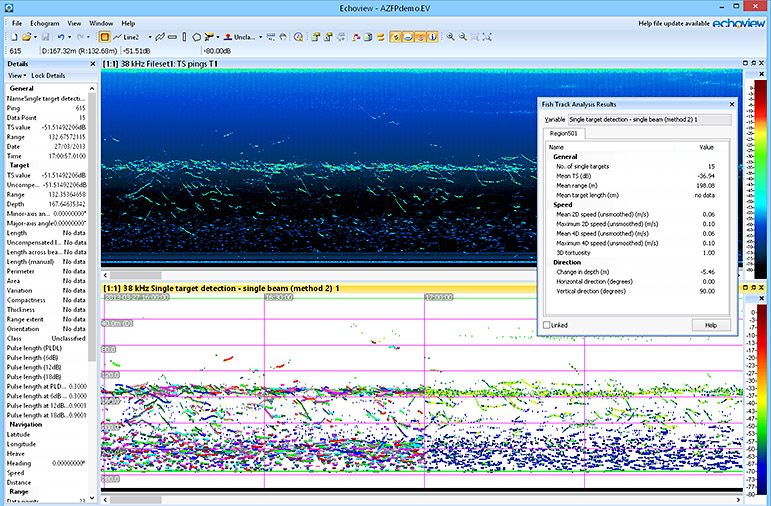
Sample Echoview screen
The Raw data flies (*.01A, etc.) from the AZFP Memory card can be imported directly in to Sonar4/5 (http://folk.uio.no/hbalk/sonar4_5/index.htm) for analysis.
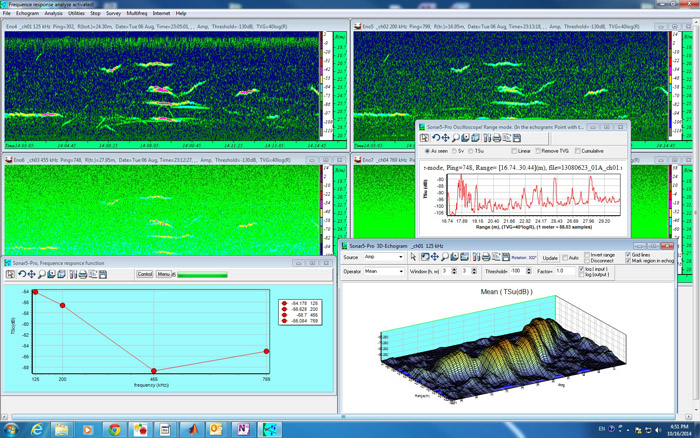
Sample Sonar5 screen
ESP3 open-source software for acoustic data visualization
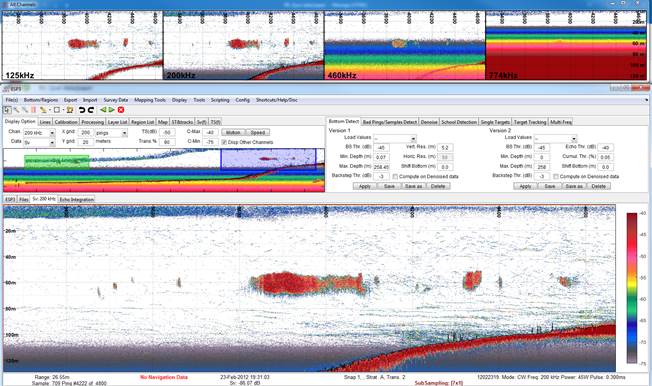
Sample ESP3 screen
ASL is interesting in facilitating the sharing of high-level programming code for AZFP Data in Matlab, Scilab, R programing or other languages. If you are interested in making your code available to other users, please contact Jan Buermans
The intent is for owners of AZFP instruments to share and improve data Scientific Post-Processing Software between themselves free of charge. Users of the software assume responsibility for the results. Programmers are asked to follow best practices and include lots of comments and notes in their programs. Programmers and users are asked to maintain a log of known problems, bugs and associated fixes.
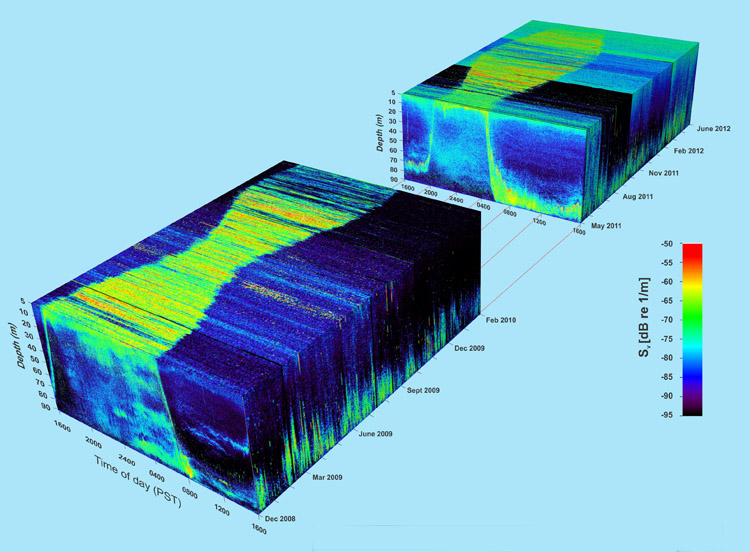
ASL's Data Cube Representation of Time Series Illustrating Seasonal Variations
AZFPLink - Basic data visualization
The AZFPLink software, normally used to configure the AZFP instrument, can be used to plot echograms for one-hour time segment. This is done from within the Echogram Tab.

Sample Echogram screen

Sample Export screen
EchoView Software Pty Ltd
The AZFP raw data flies (*.01A, etc.) from the internal memory card are fully compatible with import into the EchoView software version 7.1 and later (http://www.echoview.com/)
Sample Echoview screen
Sonar5 by University of Oslo, Dr. Helge Balk
The Raw data flies (*.01A, etc.) from the AZFP Memory card can be imported directly in to Sonar4/5 (http://folk.uio.no/hbalk/sonar4_5/index.htm) for analysis.

Sample Sonar5 screen
ESP3 open-source software for acoustic data visualization
(NIWA, Wellington, New Zealand)
ESP3 is an open-source software package for visualizing and processing fisheries acoustics data, developed by the deepwater fisheries acoustics team at NIWA (Wellington, New Zealand).
ESP3 is designed for single-beam and split-beam data. Currently supported data formats are SIMRAD (.raw) and a small number of other formats. The software allows calibration and echo-integration and a number of algorithms are coded in, including bad pings identification, automated bottom detection, single targets identification and tracking, schools identification, etc.
ESP3 is available at this link: https://sourceforge.net/p/esp3/wiki/ESP3/ .
Sample ESP3 screen
User Customized Data Processing Routines
ASL is interesting in facilitating the sharing of high-level programming code for AZFP Data in Matlab, Scilab, R programing or other languages. If you are interested in making your code available to other users, please contact Jan Buermans
The intent is for owners of AZFP instruments to share and improve data Scientific Post-Processing Software between themselves free of charge. Users of the software assume responsibility for the results. Programmers are asked to follow best practices and include lots of comments and notes in their programs. Programmers and users are asked to maintain a log of known problems, bugs and associated fixes.

ASL's Data Cube Representation of Time Series Illustrating Seasonal Variations